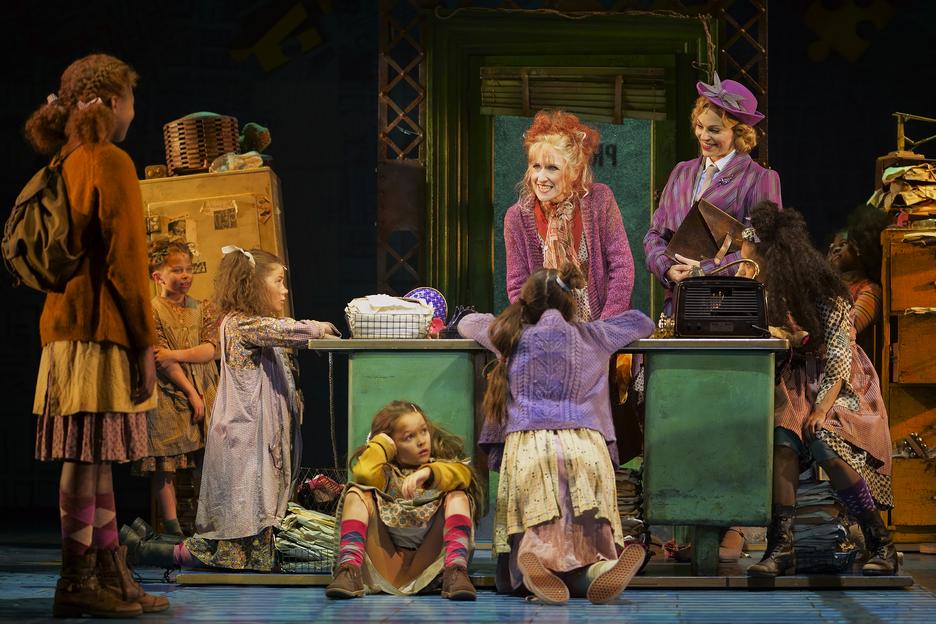
Little Orphan Annie first appeared way back in 1924, in a daily comic strip created by Harold Gray for the Daily News in New York. The strip appealed to an adult readership, as it covered the major political issues of the day, as seen from Gray’s staunchly Republican viewpoint. In a series of picaresque episodes, he depicted the wide-ranging adventures of Annie, a brave ten-year-old, accompanied by her faithful dog Sandy. Annie is taken under the wing of a rich benefactor called ‘Daddy’ Warbucks. For many years the strip was widely syndicated, and it did not come to end until 2010. By then, the record-breaking success of Annie, the 1977 Broadway musical version, had been replicated across many countries. In the musical, Franklin Roosevelt is seen in a very positive light. This is somewhat ironic, as in the original comic strip Daddy Warbucks dies of despair when Roosevelt is elected, as Harold Gray loathed his New Deal policies. However, Gray resurrected Warbucks after FDR’s death.
The show opens in a grim girls’ orphanage. The walls tower up into darkness, and huge doors and tall lamps accentuate the tininess of the occupants, lying on their starkly functional beds. The laundry boy tells them that they get ‘clean sheets once a month, whether they need them or not’. Everything is bathed in a blue-green, sepulchral light. It’s a familiar, Dickensian scene, and there is more than a touch of Oliver Twist in what is to follow, right down to a heartfelt complaint about the food. Annie appears, wielding a mop and bucket, and it becomes clear that she has a gritty determination that could get her into trouble. Last night’s Annie was played by Freya Yates with an endearing mix of feistiness and charm. She and her fellow orphans launch into a cleverly choreographed delivery of Hard Knock Life with great energy, though they are cowed into submission by the terrible threats of punishment screeched at them by the owner of the orphanage, Miss Hannigan. She is a grotesque, dipsomaniac harridan with a loathing for small girls, and she is played with gleeful abandon by Anita Dobson. Her voice swoops and soars, squawking deafeningly one moment and whispering menacingly the next, and every gesture and facial expression is employed with cartoon-like exaggeration. It’s a bravura display of comic acting of the broadest, pantomimic kind. Miss Hannigan’s partners in crime are her greasy scoundrel of a brother, Rooster, and his brash, tarty girlfriend Lily. Their singing of Easy Street is a highlight of Act One. Rooster and Lily are portrayed with gusto by Richard Meek and Jenny Gayner, who make the most of their later pretence at being a pair of frail hayseeds, Annie’s supposed long-lost parents.
There are strong performances elsewhere, though of a more restrained, down-to-earth kind. Alex Bourne is a fine Daddy Warbucks, skilfully portraying his growing affection for Annie without ever descending into mawkishness. We see the tentative beginnings of a romantic relationship with his assistant Grace, played beautifully by the sweet-voiced Carolyn Maitland. Warbucks calls on the President for help, and Gary Davis brings an entirely convincing sense of benevolent authority to his depiction of Roosevelt. He keeps his dignity even in the surreal scene where, inspired by Annie’s optimism, he urges his cabinet to burst into a rendition of Tomorrow. That number is the show’s most memorable song, so it is perhaps forgivable that it crops up no less than three times
Gary Davis also plays Lt. Ward, a policeman on the lookout for stray orphans and stray dogs. The scene where Annie tries to convince him that she owns Sandy by demonstrating that he comes to her call, is one that produced a tearful sigh from last night’s audience. Sandy is portrayed with total conviction by ‘Amber’, a delightful, shaggy labradoodle.
Daniel Griffin’s nine-piece band keep everything swinging along nicely, and all the dance sequences are full of colour and energy. Colin Richmond’s sets designs are very effective, though a repeated motif of jigsaw pieces seem to be merely decorative, rather than anything of symbolic significance. The heart of the story is undoubtedly Annie’s search for her parents and her eventual adoption by Warbucks, so the episodes that attend to the political and social context of the 1920s can seem relatively flat. The idea of an industrialist billionaire being an enlightened social reformer is a little hard to swallow, but this is a show that invites you to leave your world-weary cynicism at the door. Annie is essentially a very sentimental of a little girl’s unswerving optimism in the face of hardship, but director Nikolai Foster gives it just enough bite to avoid it becoming too saccharine. A real strength of the show is the high quality of performance from all the youngsters in the cast – bravo! Annie is good, family entertainment with a star performance from Anita Dobson. It’s a show with a particularly strong appeal to young girls – and to dog lovers – and you will be humming Tomorrow for days afterwards. Mike Whitton ★★★★☆ 20th March 2019

